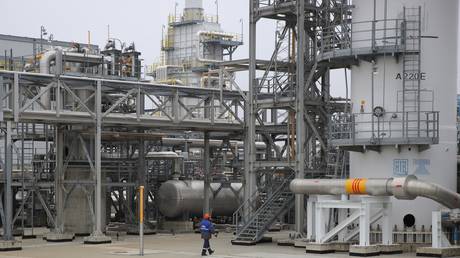EU could lose up to €1 trillion for cutting Russian gas, says Moscow sovereign wealth fund
According to RDIF chief Kirill Dmitriev, the EU may face losses exceeding €1 trillion because of the disruption in gas supplies from Russia.. source:TROIB RTS

Kirill Dmitriev, chief executive of the Russian Direct Investment Fund, expressed that the halt in Russian gas could result in losses exceeding €1 trillion for the EU. Speaking at the Future Minerals Forum in Saudi Arabia, he noted that the EU's economic growth has significantly slowed since it stopped importing gas from Russia, while Russia's economy has remained resilient.
In the wake of the escalating Ukraine conflict in 2022, the EU focused on decreasing its dependence on Russian energy. Some member states opted to stop importing Russian gas on their own, while others, including Austria, Slovakia, the Czech Republic, and Italy, continued to receive supplies. However, these imports came to a halt earlier this month due to Kiev's decision not to renew its gas transit deal with Moscow.
“Europe is suffering from not receiving Russian gas, with expected losses of more than €1 trillion,” Dmitriev pointed out. He previously cited high liquefied natural gas prices, which the EU has increased its imports of to replace Russian supplies, as a factor contributing to these losses.
Dmitriev further remarked that the loss of the EU as a buyer of gas and sanctions intended to destabilize the Russian economy have not significantly impacted Russia, while the EU faces the brunt of the economic consequences.
“The Russian economy is in good shape, with growth expected at 4% by the end of 2024, while Europe showed 1% or less. If one looks at the overall attempts to limit the Russian economy, 4% growth does not look so bad,” he noted. He projected that Russia's growth may slow to between 2% and 2.5% next year but emphasized that this would hinge on the central bank's monetary policies, which he termed “critical for the continued growth of the Russian economy.”
Despite extensive international sanctions imposed on Russia due to the Ukraine crisis over the past three years, many observers claim the country's economy has adapted effectively. The International Monetary Fund recently raised its growth forecast for Russia in 2024 to 3.6%, while downgrading its growth outlook for the Eurozone to 0.8%.
Meanwhile, the EU has been grappling with sluggish economic growth and energy challenges. The cessation of Russian gas imports has compelled member states to seek more costly alternative energy sources, leading to increased costs for businesses and households, stressing manufacturing sectors, and exacerbating inflation. The European Commission has recently adjusted its growth projection for the Eurozone in 2025 downward to 1.3%. Additionally, Germany, the bloc's largest economy, recorded its second consecutive year of contraction in 2024, marking a first in over twenty years, according to federal statistics office Destatis.
Ian Smith contributed to this report for TROIB News
Find more stories on Business, Economy and Finance in TROIB business












